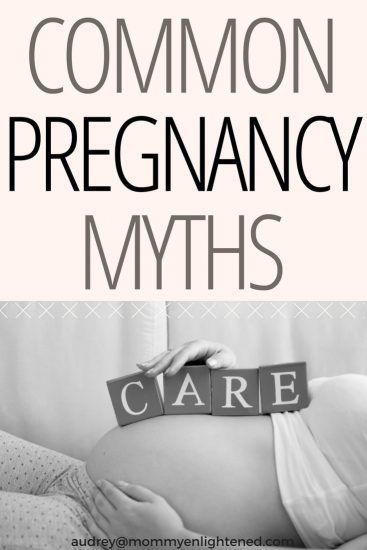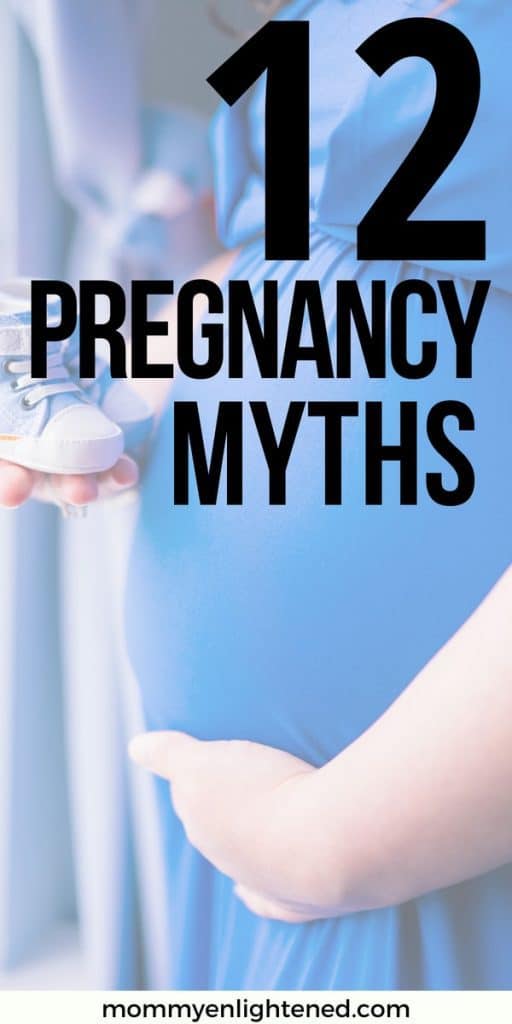There is a lot of misinformation and exaggeration when it comes to the information and “advice” that others will give you during your pregnancy. Pregnancy myths are usually somewhat based on a fact, but people tend to interpret the facts in their own original ways. This can lead to a lot of confusion and false information regarding your pregnancy.
I remember it being difficult to remember to ask the doctor the million of questions exploding out of my head every month, so I turned to my loved ones and Google for the answers.
Unfortunately, that can be pretty detrimental if you aren’t getting your info from a reputable source. Because I KNOW I am not the only mom who has done this, we wanted to bring you a list of the most common pregnancy myths and the sciencey stuff to back up the actual facts.
If you don’t have time to read this now, PIN IT for later!
There are affiliate links in this article, you can read more about this in my disclosure.
Myths About Pregnancy

Myth: You can’t have coffee
Fact: You can have coffee, you just need to limit your intake.
According to the American College of Obstetricians, “moderate caffeine consumption (less than 200 mg per day) does not appear to be a major contributing factor in miscarriage or preterm birth.” [source] They also state that they cannot be sure that there is even a correlation between high caffeine intake and miscarriage.
Related: Nursery Essentials
To be on the safe side, stick to one cup a day, as a typical cup of coffee usually contains 100-150mg. Keep in mind; if you need your Pepsi, you may have to decide between the two.
Sad. I know.
Myth: Pregnant women can’t travel by plane
Fact: This myth probably originated from the thinking that you will not have access to a health care provider on an airplane. By that same logic, pregnant women should not go camping or to your cousin’s podunk town in the middle of nowhere.
Need to learn how to breastfeed? Check out Stacey’s Milkology course
She has affordable learning for breastfeeding, pumping, and going back to work!It’s not recommended to travel after the end of the 35th week of pregnancy, but as long as your doctor gives the okay, you should be fine. If you are high-risk or experiencing complications, it’s best to discuss your option with your healthcare provider before booking your ticket.
Myth: Pregnant women can’t eat seafood
Fact: There are some kinds of seafood you SHOULD stay away from, such as fish high in mercury or other contaminants. This means you probably don’t want to catch your own fish unless you KNOW for a fact that the area is clear of contaminants.
The FDA actually encourages pregnant women to eat fish high in omega-3 fatty acids. Fish is an excellent source of several vitamins, minerals, protein–and it’s low in saturated fats.
The Omega’3s also potentially decrease the risk of premature delivery, as well as aid in brain and vision development in your baby. The FDA has a list of “best choices” to make it easy for you to figure out what fish is safe.
Myth: You are eating for two
Fact: Although you need to increase your caloric intake, most women only require an extra 300 calories a day. To give you some context, that’s a little less than a cup of cooked oatmeal.
Pregnancy cravings are a real thing, and so definitely don’t feel like you have to restrict yourself a lot. Be intentional about your eating, and try and keep it as healthy as you can.
Myth: You can’t dye your hair
Fact: There is some worry that the chemicals that are absorbed in your skin could produce a mild toxicity in your growing baby. However, the chemicals used in hair dye are NOT highly toxic, and honestly, there isn’t enough absorbed by the skin to reach your littles anyway.
If you are still concerned about it, you can opt to do highlights or wait until after your baby is born.
Myth: You have to get rid of your cat
Fact: Cats can become infected with a nasty little parasite called Toxoplasma gondii, which results in Toxoplasmosis. Cats can become infected by eating infected birds, rodents, or other small animals.
Toxoplasmosis is then passed through your cat’s feces, which is how you could potentially become infected. The parasite can be shed for up to three weeks after the infection, with mature cats being less likely to shed it.
Related: Baby Closet Ideas
Infected infants can develop serious issues later in life, such as blindness or mental disability. The infection is severe, and so it’s definitely important to be aware of. You may be asking–why should I even risk it?? It’s NOT a risk if you take a couple of precautions. Even the CDC doesn’t believe you need to give up Fluffy just yet.
Here are a couple of precautions you can take
- Don’t change the litter box–it’s that simple. If you have a partner or friend at home, have them clean the litterbox for the duration of your pregnancy.
- Keep your kitty indoors.
- Don’t get a new cat while pregnant
- If you HAVE to change the litter box, wear gloves and wash your hands when you are done.
Keep in mind; the same parasite CAN be spread by other means (such as fruits and veggies in contact with contaminated soil or water). As long as you DON’T lick your hands after changing the litter box (ew) and you wash your produce, your risk is pretty minimal.
Myth: Lotion can prevent stretch marks
Fact: Nothing can prevent stretch marks. If they are going to happen, they will happen. 8 out of 10 pregnant women will get stretch marks, so don’t feel too bad if you find you are developing some.
The cause of stretch marks is a combination of your genetics and the fact that your skin doesn’t have the time to adjust to the rapid growth of your baby. 4
There ARE some things you can do that may help minimize the number of stretch marks you get. Some of these include
- Eat foods rich in zinc, as zinc is essential for skin health. Foods rich in zinc include meat, seeds, nuts, and dairy.
- Get sufficient Vitamin D. A conclusion of a study performed has shown us a decrease in stretch marks in people who have appropriate Vitamin D levels. [source] This means you need to go out and get some sun! There are also foods high in Vitamin D, such as some seafood and egg yolks.
- Take your vitamins. Stretch marks are more likely if you’re lacking in the nutrition department. You definitely want to be eating healthy as well, but your prenatals should help you get that extra boost to keep you nutrient rich.
- Drink water. Stretch marks are less likely to appear in hydrated skin. Keep in mind, you need to drink about 2 ½ liters of water a day while pregnant.
- Treat them when they appear. Talk to your doctor and see what he recommends. It may be as simple as applying an over the counter or medicated lotion, but the sooner you begin treating it, the better chance you have at making them disappear.
- Appropriate weight gain. You NEED to be gaining weight during your pregnancy, but don’t gain too much. Talk with your doctor about what they want you to be gaining every month, and try and be mindful of it. Additional weight gain may cause your stretch marks to be more severe.
- Moisturize. Although you cannot entirely PREVENT stretch marks, there is a better chance you will minimize them if you keep those danger areas hydrated. Pick up some products like this lotion specifically for stretch marks
, or my favorite Shea butter lotion and apply generously to your legs and stomach.
Myth: You can tell it’s going to be a boy because he has a low heart rate.
Fact: Gender prediction theories are all baseless, so make sure you don’t fall into the trap of believing them. They can be fun to read, just make sure you are taking them with a grain of salt.
Check out this NEW + affordable childbirth course
She has options for both natural AND medicated birth!! . Use coupon code AUDREY10 for 10% off!With that said, many women who have a gut feeling about their baby’s gender tend to be right, but certainly, don’t count on this as fact. I thought both of my babies would be girls, and they were. Who knows if there is anything scientifically based on a mother’s “feeling.”
Related: First Trimester Checklist
Myth: You can’t take baths when you are pregnant
Fact: It would be SO sad if this were true–but thankfully it’s not! Baths were MY saving grace with my pregnancies, as this was the ONLY place I was able to get comfortable with my second pregnancy. It is important to make sure that the bathtub does not get too hot. Ideally, it should stay under 100 degrees Fahrenheit.
Myth: Having sex can hurt your baby
Fact: Having sex is perfectly safe most of the time while you are pregnant unless you are doing something really crazy.
Now, you should check with your provider if you are at high risk for a preterm baby, or if your placenta is positioned between your cervix and vagina.
Personally, my husband was always a little weirded out about the whole ordeal, but remind your partner that you guys will have A LOT less time once the baby is here. Take advantage of it while you can!
Myth: If you have heartburn, your baby will have lots of hair!
Fact: This is another baseless claim that has no scientific evidence to back it up. Heartburn is a super common symptom during pregnancy and has nothing to do with the amount of hair your littles is growing.
The upside to this symptom is that there IS medication over the counter or that your doctor can prescribe you that is safe for use during pregnancy.
Myth: All women can breastfeed if they really want to
Fact: There are around 2% of women who CAN’T produce enough milk to feed their baby. It’s a small number, but it happens. Breastfeeding is a VERY personal choice, and a woman should not be looked down on if she chooses to do differently.
Most women who believe they don’t produce enough milk usually can, they just don’t understand the fundamentals of breastfeeding very well. This isn’t to say these women are unintelligent, but breastfeeding is a complicated process!
If you are still on the fence or feel overwhelmed by the thought of breastfeeding, consider looking into Stacey’s Milkology course. She’s a certified lactation consultant who has a wealth of knowledge about the topic.
Myth: Spicy food can help induce labor
Fact: There have been a lot of studies done on different natural methods to induce labor; however, most of the research is inconclusive. Although spicy food is unlikely to put you into labor, I can almost guarantee it’s a great way to experience heartburn!
What other pregnancy myths have you heard? Did any of these surprise you? I would love to hear about it in the comment section below!
If you enjoyed this post, please pin it or subscribe for similar content.
Related:

